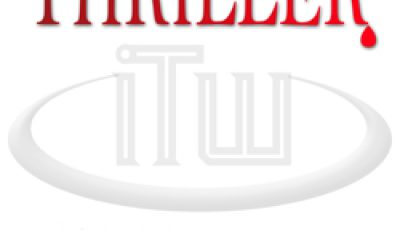

September 17 – 23: “E-Reader or paper book?”
 This week ITW Members Wendy Staub, Nancy J. Cohen, Grant Jerkins, Audrey Braun, Jean Harrington and Jeff Carlson discuss the E-Reader vs. the paper book: “Why one over the other? Why not both?” Tune in to what’s sure to be a thrilling discussion!
This week ITW Members Wendy Staub, Nancy J. Cohen, Grant Jerkins, Audrey Braun, Jean Harrington and Jeff Carlson discuss the E-Reader vs. the paper book: “Why one over the other? Why not both?” Tune in to what’s sure to be a thrilling discussion!
~~~~~
 Jean Harrington lives in Naples, Florida with her husband John. No cat, no dog, no children anymore. After seventeen years of teaching English lit at Becker College in Worcester, Massachusetts, she now spends her days—and nights– writing the Murders by Design Mystery Series for Carina Press. And is having great fun wallowing knee deep in fictional dead bodies. Designed For Death was the first in Jean’s light-hearted Naples-set novels. The second book in the series, The Monet Murders, was released in June. The third, Killer Kitchens, another of heroine Deva Dunne’s sleuthing-by-design adventures, is due out in spring 2013.
Jean Harrington lives in Naples, Florida with her husband John. No cat, no dog, no children anymore. After seventeen years of teaching English lit at Becker College in Worcester, Massachusetts, she now spends her days—and nights– writing the Murders by Design Mystery Series for Carina Press. And is having great fun wallowing knee deep in fictional dead bodies. Designed For Death was the first in Jean’s light-hearted Naples-set novels. The second book in the series, The Monet Murders, was released in June. The third, Killer Kitchens, another of heroine Deva Dunne’s sleuthing-by-design adventures, is due out in spring 2013.
 Grant Jerkins is the author of THE NINTH STEP and AT THE END OF THE ROAD. Barbet Schroeder (Barfly, Reversal of Fortune) is attached to direct the film version of his first novel, A VERY SIMPLE CRIME—adapted for the screen by Oscar-nominated screenwriter Nicholas Kazan (At Close Range, Reversal of Fortune). Grant lives in the Atlanta area with his wife and son.
Grant Jerkins is the author of THE NINTH STEP and AT THE END OF THE ROAD. Barbet Schroeder (Barfly, Reversal of Fortune) is attached to direct the film version of his first novel, A VERY SIMPLE CRIME—adapted for the screen by Oscar-nominated screenwriter Nicholas Kazan (At Close Range, Reversal of Fortune). Grant lives in the Atlanta area with his wife and son.
 Wendy Corsi Staub’s nearly eighty novels include multiple New York Times bestsellers. Her latest, NIGHTWATCHER (9/12) and SLEEPWALKER (10/12), launch a new suspense trilogy for Harpercollins, concluding with SHADOWKILLER (2/13). She’s under contract for another suspense trilogy for Harper. Honors include a RWA Rita, four WLA Washington Irvings, the RWA-NYC Golden Apple for Lifetime Achievement and the RT Bookreviews Career Achievement Award in Suspense. Her 2010 thriller LIVE TO TELL was an Edgars finalist for the Mary Higgins Clark Award.
Wendy Corsi Staub’s nearly eighty novels include multiple New York Times bestsellers. Her latest, NIGHTWATCHER (9/12) and SLEEPWALKER (10/12), launch a new suspense trilogy for Harpercollins, concluding with SHADOWKILLER (2/13). She’s under contract for another suspense trilogy for Harper. Honors include a RWA Rita, four WLA Washington Irvings, the RWA-NYC Golden Apple for Lifetime Achievement and the RT Bookreviews Career Achievement Award in Suspense. Her 2010 thriller LIVE TO TELL was an Edgars finalist for the Mary Higgins Clark Award.
 Nancy J. Cohen is an award-winning author who writes mysteries and romance. Her humorous Bad Hair Day mystery series features hairdresser Marla Shore, who solves crimes with wit and style under the sultry Florida sun. Several of these titles have made the IMBA bestseller list, while Nancy’s imaginative romances have also proven popular with fans. Her latest title is WARRIOR PRINCE: Book One in the Drift Lords Series from The Wild Rose Press.
Nancy J. Cohen is an award-winning author who writes mysteries and romance. Her humorous Bad Hair Day mystery series features hairdresser Marla Shore, who solves crimes with wit and style under the sultry Florida sun. Several of these titles have made the IMBA bestseller list, while Nancy’s imaginative romances have also proven popular with fans. Her latest title is WARRIOR PRINCE: Book One in the Drift Lords Series from The Wild Rose Press.
 Audrey Braun is the pen name of novelist Deborah Reed. She has lived all over the United States and in Europe, and currently resides in the Pacific Northwest with her family. A SMALL FORTUNE is her debut, bestselling thriller. FORTUNE’S DEADLY DESCENT, her follow-up, is the second of a trilogy.
Audrey Braun is the pen name of novelist Deborah Reed. She has lived all over the United States and in Europe, and currently resides in the Pacific Northwest with her family. A SMALL FORTUNE is her debut, bestselling thriller. FORTUNE’S DEADLY DESCENT, her follow-up, is the second of a trilogy.
 Jeff Carlson is the international bestselling author of Plague Year and The Frozen Sky. To date, his work has been translated into fifteen languages worldwide. Readers can find free fiction, videos, contests, and more on his web site at www.jverse.com
Jeff Carlson is the international bestselling author of Plague Year and The Frozen Sky. To date, his work has been translated into fifteen languages worldwide. Readers can find free fiction, videos, contests, and more on his web site at www.jverse.com
- LAST GIRL MISSING with K.L. Murphy - July 25, 2024
- CHILD OF DUST with Yigal Zur - July 25, 2024
- THE RAVENWOOD CONSPIRACY with Michael Siverling - July 19, 2024
